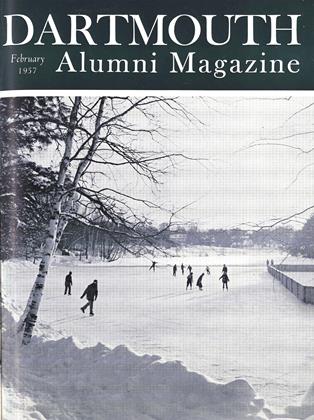ARNOLD BENNETT wrote of Edmund Blunden's Undertones of War, first published in 1928: "This book will be a classic." Many now consider it the best book written about the First World War, "if not the best of all our war books." I have long admired it and am glad to own a first edition. However, for those who do not own it, or who do not even know it, a fine reprint is now available, with a new preface, in the Oxford World Classics. I am enjoying a re-reading and it takes me back to the nostalgic days of youth when the magic names of Thiepval, Baupaume, Ypres, Zillebecke, and Poperinghe, rang like a clarion call to death and romance for thousands.
Another Oxford Press book I have enjoyed is Cecil Emden's delightful study of Gilbert White, with illustrations by Lynton Lamb. Gilbert White in His Village presents a most intimate view of this naturalist taken from his journals. It reveals him as a man with a real capacity for friendship and with a genius for detail. Nothing is written here that cannot be authenticated and yet Mr. Emden's scholarship is worn lightly. There is nothing PhDish or ponderous here. A map of Selborne Village and vicinity is used as end papers. This is a book for all garden lovers and naturalists.
A novel which, in translation, was greeted with huzzas in England is Alejo Carpentier's The Lost Steps, published in this country by Alfred A. Knopf. Edith Sitwell wrote of it: "This is a giant book. I am overwhelmed by the majesty, the scale, the sweep, the miraculous use of language (and the translation is superb). Carpentier is, most certainly, one of the greatest writers alive at this time."
This is a story of a man who finds himself dissatisfied with his marriage and with the United States. He seeks escape in the savage country of the Orinoco and as he recedes into primitive life he finds satisfaction again. Finally, however, this does not satisfy him either, and we find him at the end baffled by both civilization and primitive life. Carpentier, interested in music and architecture, was born in Havana in 1904. Definitely, this is a book to read.
What Doubleday calls the definitive biography of Joseph Conrad has now ap- peared. Jean-Aubry has, after 23 years, finally produced The Sea Dreamer. This is not a long book (286 pages of actual text) but it does pack a lot of information about the Polish genius, whose funeral I attended in Canterbury in 1924. I read the book with intense interest as Conrad has always been one of my literary gods. His early life in Poland with his ailing mother, who died young, and in exile with his mother and father who was most unhappy and unhealthy, is painstakingly described. Conrad never forgave the Russian tyranny which killed his family. His anti-Russian strictures can be read with complete understanding today even though he was born a century ago. Conrad was one of the great artists of the twentieth century and if the glow of his fame has dimmed slightly, it will reappear in a greater burst than ever. Read again Youth, The Mirror of The Sea, The Heartof Darkness, and Nostromo and judge for yourself. The new biography contains notes, a bibliography, and an index.
Ranny Hobbs '30, vice-president of Rinehart and Company and an old student and friend of mine, sent me for Christmas, Alden Hatch's story of Remington Anns, which is surely a genuine piece of Americana. There are many illustrations of guns from the earliest times to the present. Eliphalet Remington turned out, by hand, his first gun in 1816, and today the firm he founded is a vast diversified industrial empire. This is for any sportsman, industrialist, or lover of American history.
Prize Stories of 1957 contains, as usual, many stories seen only by the cognoscenti who read the Kenyon and Hudson reviews, though The New Yorker (Jean Stafford and John Cheever), The AtlanticMonthly, Harper's, and Mademoiselle (William Faulkner) are represented, among others.
There is something rather sterile about these stories. If they do not smell of the lamp, they smell of writers' conferences, and few have an air of freshness about them. Or maybe I am just tired and disillusioned about short stories.
Tom Beers '34 sent me another wonderful Lakeside Press book: Milford's Memoir, an early account of the Creek nation in America which covered much of the territory south of the Tennessee River. This is the kind of book I revel in, read slowly, and thoroughly enjoy.
 View Full Issue
View Full Issue
More From This Issue
-
 Feature
FeatureSoldiers As Policy Makers
February 1957 By JOHN HURD '21 -
 Feature
FeatureBuilding for Today—and 1969
February 1957 By PROF. JOHN P. AMSDEN '20, -
 Feature
FeatureA Running Start
February 1957 -
 Feature
FeatureTo Make What's Good Better
February 1957 By R. L. A. -
 Class Notes
Class Notes1918
February 1957 By ERNEST H. EARLEY, W. CURTIS GLOVER, RICHARD P. WHITE -
 Class Notes
Class Notes1926
February 1957 By HERBERT H. HARWOOD, H. DONALD NORSTRAND
HERBERT F. WEST '22
-
 Article
ArticleHANOVER BROWSING
January 1935 By Herbert F. West '22 -
 Article
ArticleHanover Browsing
June 1938 By HERBERT F. WEST '22 -
 Article
ArticleHanover Browsing
October 1942 By HERBERT F. WEST '22 -
 Article
ArticleHanover Browsing
August 1944 By HERBERT F. WEST '22 -
 Article
ArticleHanover Browsing
December 1948 By HERBERT F. WEST '22 -
 Books
BooksA CAMP AQUATIC PROGRAM,
June 1949 By Herbert F. West '22







